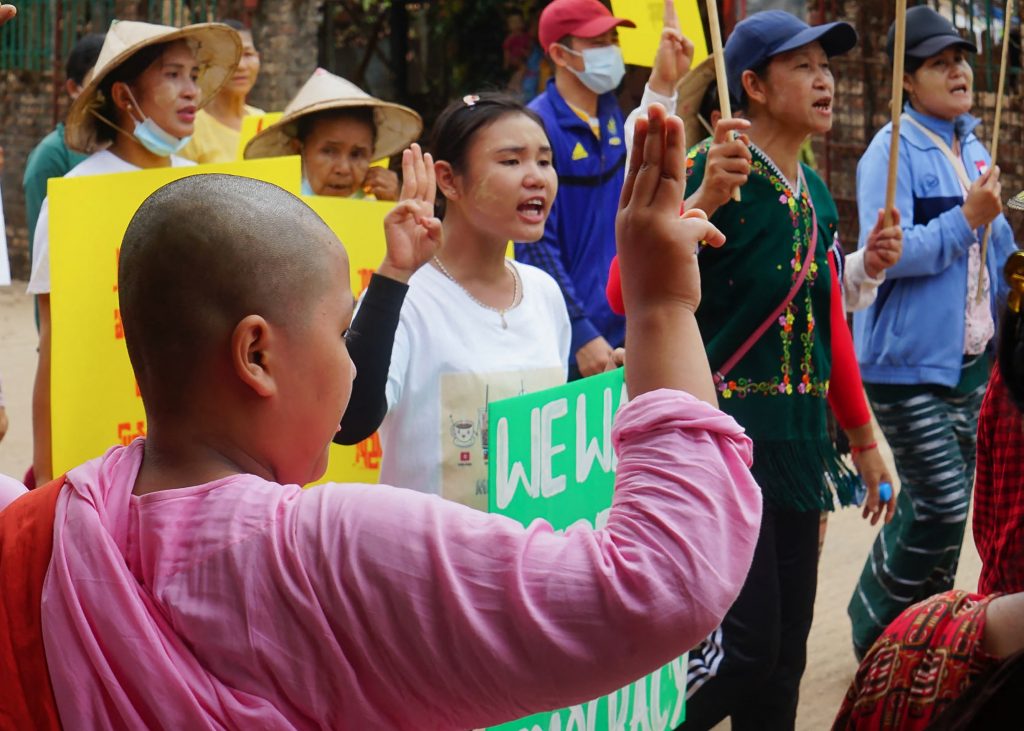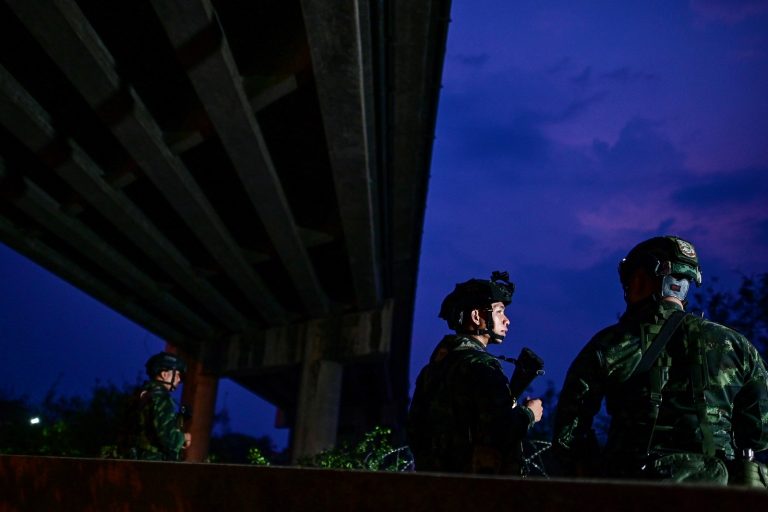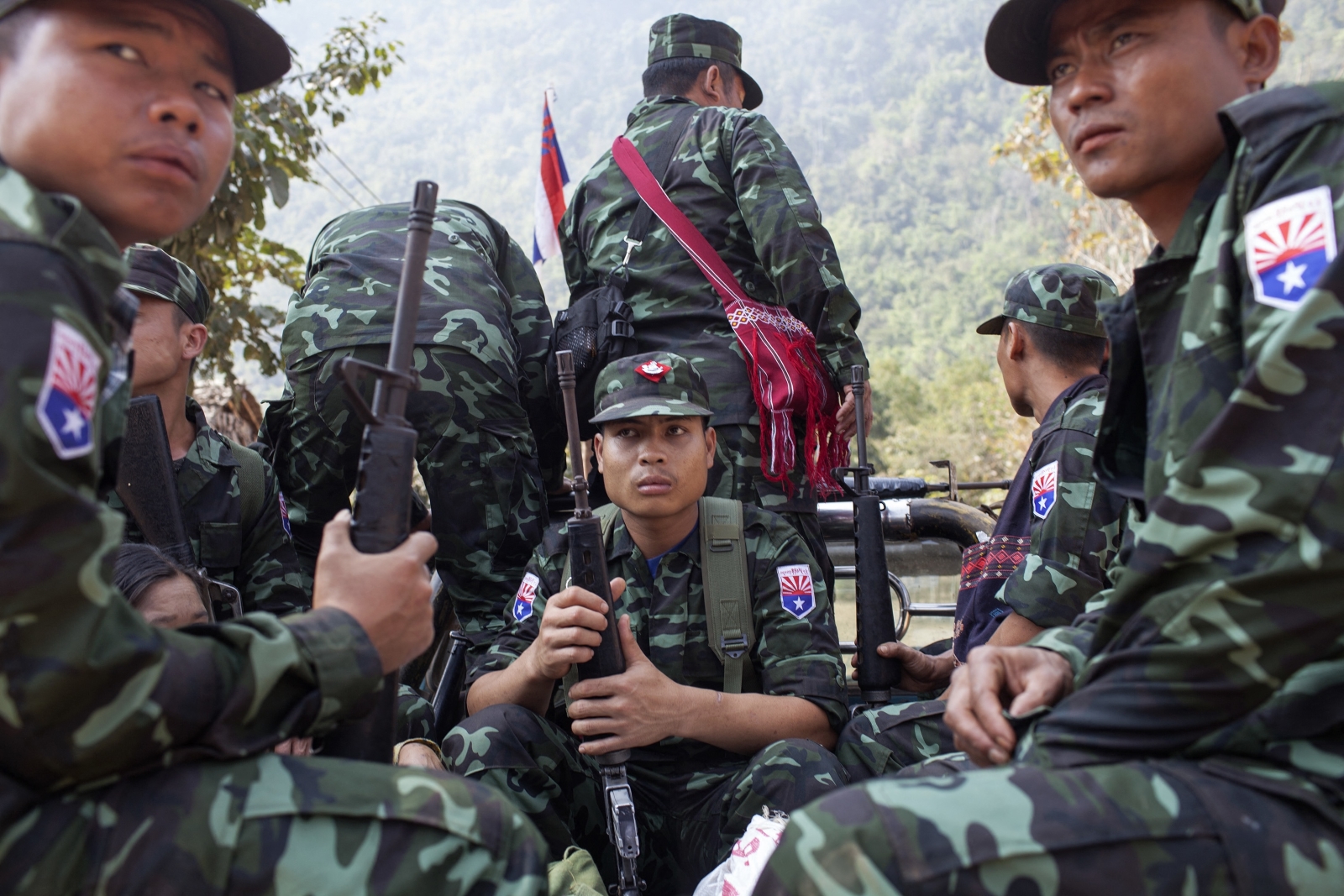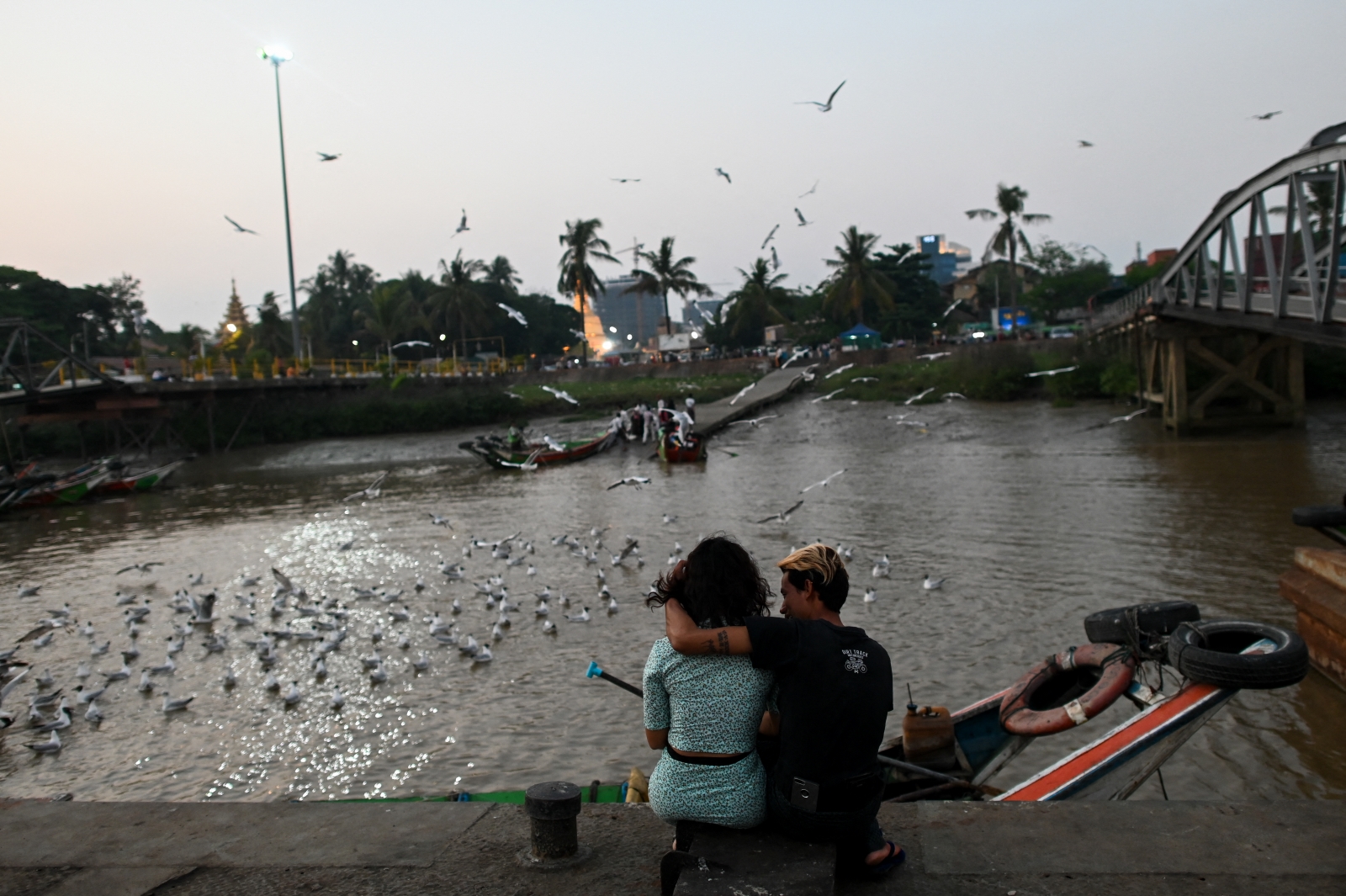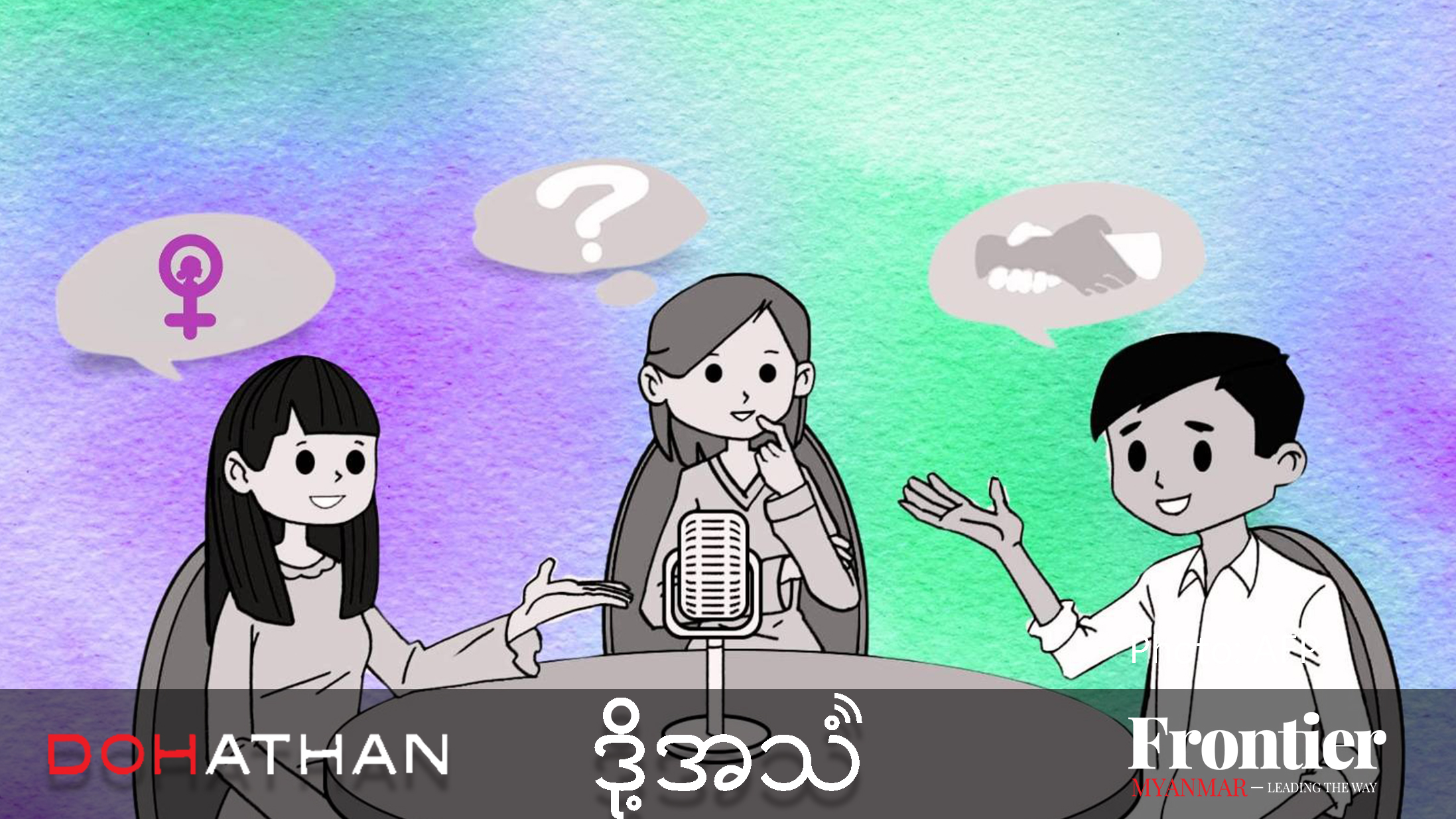Ethnic nationality women have been heavily involved in protests against the coup, and hope the unity among the anti-military movement will pave the way for a federal future.
By MAGGI QUADRINI and MACARENA AGUILAR | FRONTIER
Born and raised in Kachin, Soi Ling, 26, is no stranger to the heavy presence of soldiers. Myanmar’s most northerly state has seen decades of armed conflict, in which civilians have paid a heavy price, however she has never felt as unsafe as she does now – nor as determined to resist oppression.
“Every day is difficult for me. I worry about my security and that of my comrades,” she said. “It’s not the same as in the past. Now the military is unlawfully and visibly killing innocent people across the country on the streets and in their homes. I am more scared now,” said Soi Ling, who spoke to Frontier using a pseudonym because of concerns for her safety.
On February 28, she narrowly escaped arrest while protesting against the coup in Myitkyina, the state capital, after a group of frontline demonstrators she was with was surrounded by police and soldiers.
When she realised her frontline group had been separated from the rest of the crowd, her heart raced and she was gripped by fear, but quickly ordered her fellow protesters to run and seek shelter in nearby houses.
“Splitting up during a protest makes us more vulnerable to crackdowns, and the security forces are more likely to recognise us and come to arrest us at night,” she said.
No late-night arrest came, but the next day 74 protesters were arrested. The Peace-talk Creation Group, a Kachin-based conflict mediation group, helped broker their release.
Despite the mass arrest and the more recent killing of protesters in Kachin, Soi Ling has remained heavily involved in the protest movement. She is among the many women who are playing prominent roles in anti-coup demonstrations and the Civil Disobedience Movement, both which have swept across the country since the February 1 coup. Women have participated in resistance movements in Myanmar for decades, but their involvement in these demonstrations has been more visible than the past. The Women’s League of Burma has estimated that 60 percent of those protesting are women, and a growing number are paying with their lives.
Women interviewed for this article said they felt that at the protests they had attended and witnessed online, women had been more outspoken than men in their calls for the end of dictatorial military rule in Myanmar.
“During protests, people are afraid to say they do not want the dictatorship to rule the country, but women are speaking the truth and being more vocal than men,” Soi Ling said, recalling a female teacher who had said in front of a crowd, “The hand wielding chalk will win over the hand wielding guns.”
Soi Ling said that many women were playing important roles in organising and fund-raising for the CDM, which aims to cripple the military government through public sector strikes and walkouts by private sector workers in strategic industries such as banking and transport.
“To shut down the cycle of dictatorship once and for all, it is necessary that government staff join the CDM,” said Soi Ling. Its objective, she said, is to make the military government “like a car without an engine and wheels”, and in order to achieve that objective public servants required support and encouragement.
Soi Ling regards the CDM as an opportunity to give women a vanguard role in opposing the coup. As well as her efforts to show appreciation for public servants who have joined the CDM and to encourage more of them to go on strike, she is also helping to raise funds to support striking government employees, as well as arranging safe houses for those being hunted by security forces, and collecting video records of crackdowns and other incidents.
Women are forming study groups to learn from protest movements in Ukraine, Thailand and Hong Kong to help plan future tactics in the CDM, she said. Similar to the protest movements in these countries, Soi Ling and her fellow demonstrators avoid stand-offs with security forces and tactically disperse at their approach to avoid arrests, injuries, or worse. She recalls that on 28 February, “we had to run, but we refused to give up our spirit”.
Street protests and the CDM have gained significant momentum in Kachin, but there have been casualties. A vicious crackdown in Myitkyina on March 8 left two protesters dead and there have been at least 10 deaths elsewhere in Kachin, where a resumption of hostilities between the Tatmadaw and the Kachin Independence Army since the coup has also contributed to heightened tensions.
“Every day is difficult for me due to concerns about my security and that of my comrades,” she said, referring to her narrow escape on February 28.
“More than a hundred people were protesting that day and at least half of them were women; if anything bad had happened that day as a result of my decisions as one of the protest leaders I would have regretted it for the rest of my life,” she said.
Young people from different backgrounds in Myitkyina have formed a Working Team of Alliance for Kachin State Civilian Movement that meets in secret each day to plan protest activities. The plans are posted on social media and group chats after each meeting, Soi Ling said.
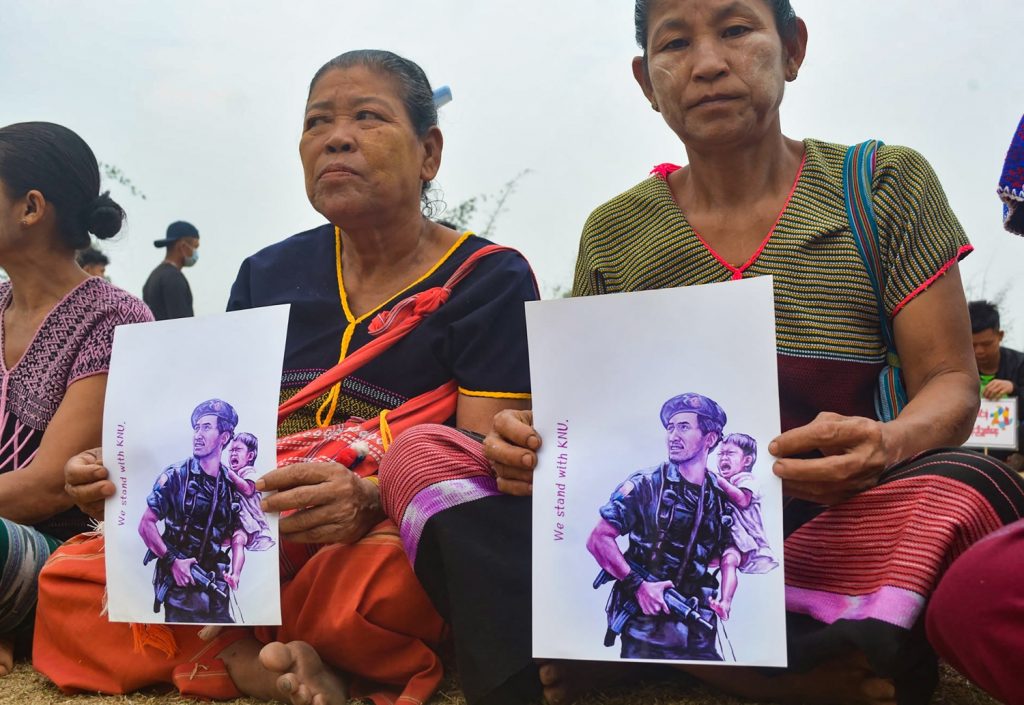
A tradition of dissent
Women from ethnic minorities in particular have been voicing demands that differ in emphasis from those protesting in big cities, such as for a federal democratic union as a pathway forward for true and meaningful reconciliation, as well as the withdrawal of Myanmar soldiers from their villages.
The resistance against the coup has also created a unified message, from the hills and mountains of the border areas, to the plains of central Myanmar, that the military is not the legitimate government, and that they must no longer be able to enjoy widespread impunity for their many crimes against the Myanmar people.
Yet while many Bamar people, especially younger generations, are now beginning to understand the struggles ethnic minorities have faced in Myanmar for decades, these groups’ own calls for a federal future are nothing new. For years they have demanded a greater say in decisions that impact their everyday lives.
On the other side of the country from Kachin, in easterly Kayin State, a leading Karen women’s rights activist is playing a prominent role in resisting the coup.
“We called for the withdrawal of the military in our areas even before the coup,” said Naw Wahkushee, who is also director of the Karen Peace Support Network, an alliance of more than 20 Karen groups active along the border with Thailand. “We should not forget [that the ousted government] was only a quasi civilian government, and the military was still very powerful,” she said, pointing to the 2008 Constitution that entrenches its power.
Karen civil society groups are providing cross-border support to the CDM, for example by helping to relocate activists to different areas for their safety, and providing assistance in the form of VPNs and digital security apps, as well as helping to cover the cost of medical care for activists who need immediate attention and cannot afford treatment.
Wahkushee said ethnic nationalities had suffered under military rule for decades and claimed that, until now, their struggles were largely ignored.
“These attacks in the ethnic areas have been going on for many years, but people were not paying attention. There has been a lack of media attention because people have been looking at progress and reforms that took place in the cities, rather than the whole story of Burma,” she said.
In Kayin State, groups such as the KPSN have long called for the immediate withdrawal of the Tatmadaw from their villages, and women have helped to organise rallies seeking recognition of ancestral land and for it to be protected from big development projects. Karen women’s groups are strong and have considerable influence in the state, Wahkushee said.
“The women are quite organised,” she said. “They are united and support each other alongside the Karen National Union at the township, district and village level.”
Wahkushee said it was inspiring to see women taking leading roles in opposing the coup. She singled out for praise women from the younger generation who had spurned entrenched forms of resistance and were developing fresh strategies for confronting an old enemy.
“They are more open and more creative and we have seen efforts to more fully understand each other’s situation,” she said.
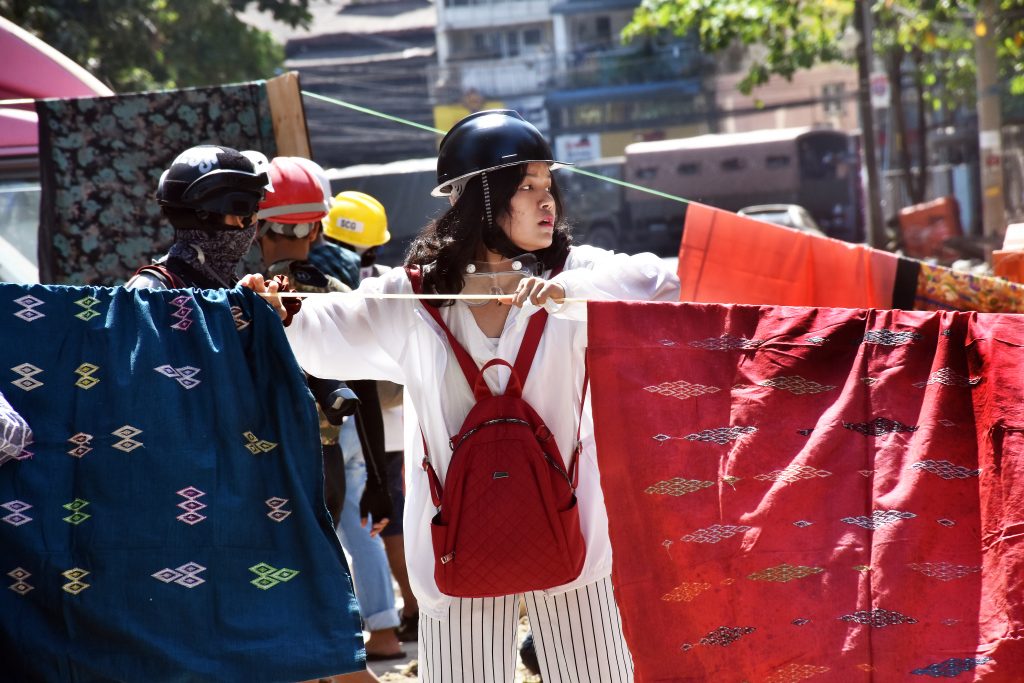
Women under fire
Many of those killed in crackdowns by the security forces have been women. Ma Mya Thwe Khaing, 19, became the first martyr of protests against the coup when she suffered a fatal bullet wound to the head in Nay Pyi Taw on February 10 and died nine days later. Frontline protester Ma Kyal Sin, 19, nicknamed “Angel”, was shot in the head in Mandalay on March 3. She was described as a brave and compassionate woman who had said it was her wish to donate her organs if she died while protesting.
“We worry for them and their security,” Wahkushee said of women protesters. “There is no rule or law and no protection for them because the military continues to act with impunity. We do not know what has happened to them [after they are detained],” she said.
Women are also at risk of sexual violence if detained by the Tatmadaw, and those from ethnic minorities are all too familiar with soldiers using sexual violence as a weapon against them.
As documented in ‘License to Rape,’ a 2002 groundbreaking report by the Shan Women’s Action Network and the Shan Human Rights Foundation, rape had long been used by the Tatmadaw as a tool of counter-insurgency. Little has changed since then. In its final report findings in 2019, the United Nations Fact-Finding Mission on Myanmar said the military’s soldiers “routinely and systematically employed rape, gang rape and other violence and forced sexual acts against women, girls, boys, men and transgender people in blatant violaion of international human rights law”.
“If I get arrested, I am afraid of sextual harassment and violence,” Soi Ling said.
Meanwhile, in Kayah State, which borders Kayin to the north, women are playing diverse roles in the protest movement, including by drawing attention to the military’s history of sexual violence, and urging more women to join the protest movement.
A member of the Karenni National Women’s Organization, who wished to remain anonymous, said that ethnic youth and women’s groups were experienced at organising rallies.
“Women are taking on multiple roles, though most of the public speeches have been made by men,” she said, adding that the coup had created opportunities for the state’s residents to achieve unity.
“We can voice concern for ethnic people, women, LBTQI and other marginalised groups,” she said. “There were LBTQI protesters who joined us every day with new and innovative ideas to bring visibility to our activities, and this is rare for us to see” in Kayah, she added.
Women’s undergarments, as well as the female sarong known as a htamein, have been displayed at some protests in Kayah. This both challenged the superstitious belief that women are less powerful than men because they menstruate, and took advantage of the related belief that men lose their spiritual power if they come into contact with women’s lower garments, in order to deter soldiers and police.
This was taken even further on 8 March when a feminist campaign to mark International Women’s Day called for htameins to be held high across the country.
“Women who have been resisting all forms of dictatorship have a deeper understanding of racism, sexism and class issues,” the Karenni woman said. “If supporting the CDM is an effective way to end the military dictatorship, then women who have experienced discrimination for many years have no reason to stop risking their lives,” she added.
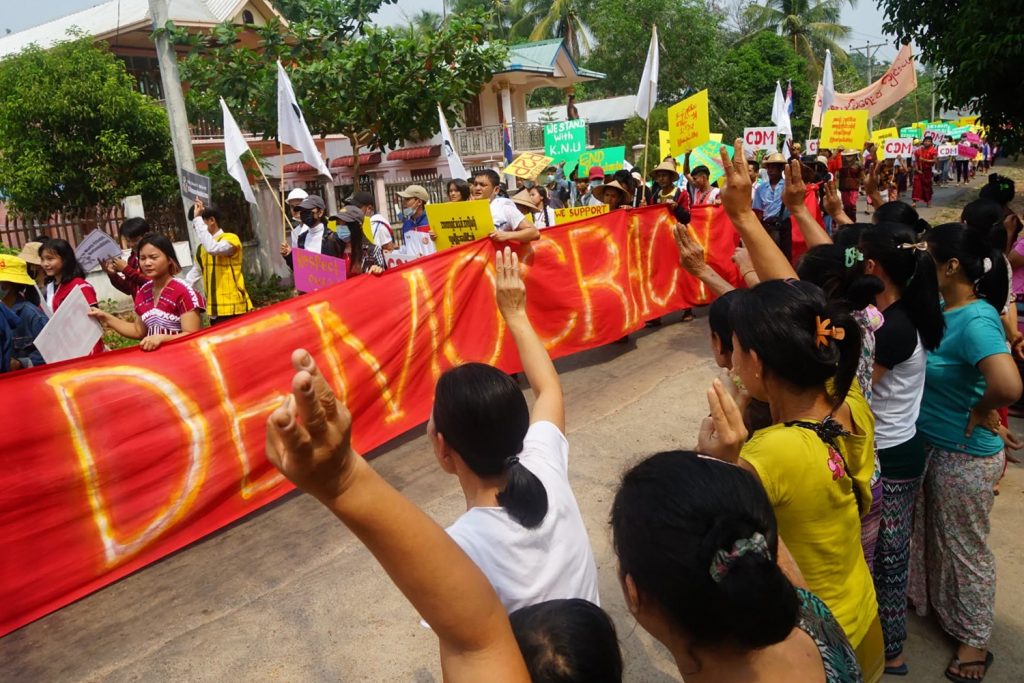
Calls for self determination
Women are also at the forefront of demands for a federal democratic union, a prominent call being made by protesters across the country. Ethnic nationality activists have long called for a federal constitution to be enacted, but before the coup no cohesive strategy for that vision was established.
Soi Ling believes it is critical for the country to have a new system of governance that is free of dictatorship and listens to the voices of the people.
“Most [Bamar] now have a better understanding of ethnic people,” said Soi Ling, adding that many Bamar had posted on social media, and held banners at protests, with messages apologising to ethnic nationalities for not understanding their past struggles.
It will take more than solidarity to achieve a federal democratic union, however. Wahkashee said that any new government must acknowledge past crimes and address the oppression that ethnic nationalities have experienced for years.
“When we have to face struggles, we need to talk about ethnic rights and equality first; equality for ethnic people is the first priority,” she said. “In the past, the military suppressed our history and promoted the propaganda that bad ethnic people were ‘rebels’. We rebel because we have been unjustly oppressed,” she added.
Wahkushee said she hoped the protests would inspire a new, more inclusive, public discourse.
“This should be the time for us to think in new ways,” Wahkushee said. “The past strategies did not work. We should try to think of a new way to get people to come together.”


